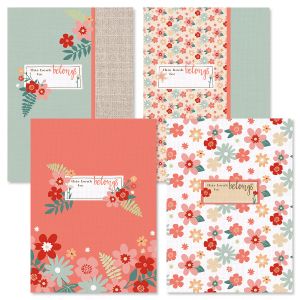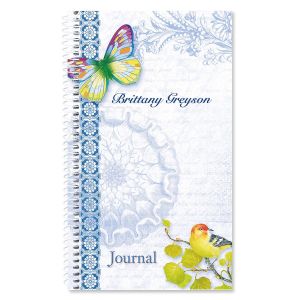 Did you know that writing can make you smarter? According to a report by the University of Victoria, B.C., Canada, Department of Linguistics, “Writing as part of language learning has a positive correlation with intelligence,” and “One of the best single measures of overall intelligence as measured by intelligence tests is vocabulary.” Journaling naturally increases our vocabulary as we search for just the right words to express what we are feeling, experiencing, or thinking. Journaling has many other benefits, in addition to stretching vocabulary. If you have yet to experience the joys of journaling, perhaps the following benefits will inspire you to start.
Did you know that writing can make you smarter? According to a report by the University of Victoria, B.C., Canada, Department of Linguistics, “Writing as part of language learning has a positive correlation with intelligence,” and “One of the best single measures of overall intelligence as measured by intelligence tests is vocabulary.” Journaling naturally increases our vocabulary as we search for just the right words to express what we are feeling, experiencing, or thinking. Journaling has many other benefits, in addition to stretching vocabulary. If you have yet to experience the joys of journaling, perhaps the following benefits will inspire you to start.
 Increased happiness. Being grateful for the things you have – the big things, little things, and everything in between – leads to a greater sense of happiness, not the other way around. Gratitude is having an appreciation of the good things in your life. Journaling about the everyday blessings you experience can lead to a deeper mindfulness, being present in the moment rather than dwelling on the past or worrying about the future. When you are mindful of everything you have to be thankful for in a day, problems of the past fade away and what may happen in the future becomes less worrisome. The effect of gratitude has been described as an “upward spiral” – the exact opposite of the downward emotional spiral many experience as a result of anxiety and negativity.
Increased happiness. Being grateful for the things you have – the big things, little things, and everything in between – leads to a greater sense of happiness, not the other way around. Gratitude is having an appreciation of the good things in your life. Journaling about the everyday blessings you experience can lead to a deeper mindfulness, being present in the moment rather than dwelling on the past or worrying about the future. When you are mindful of everything you have to be thankful for in a day, problems of the past fade away and what may happen in the future becomes less worrisome. The effect of gratitude has been described as an “upward spiral” – the exact opposite of the downward emotional spiral many experience as a result of anxiety and negativity.- Better goal achievement. Would you consider building a house without a set of blueprints? Of course not! Writing down your goals in a journal is like drawing up a blueprint for success. Journaling about your goals gives them structure and form, much like blueprints give a building structure and a set of plans with which to move toward completion. Writing down your goals signals to your brain that they are important and your reticular activating system (RAS), the gatekeeper of information that is allowed into your conscious mind, then seeks out and recognizes relevant opportunities and tools to achieve those goals.
- Emotional management. Journaling can be a great outlet for emotions, preventing you from saying or doing something you may regret later. By writing down your emotions and examining the events that precipitated them, you can discover the people, situations, and events that trigger negative emotions. This process of discovery leads to greater self-awareness and increased emotional intelligence, which can then help avoid reacting to these emotional triggers in the future.
- Emotional healing. The physical act of writing about negative experiences is a way of processing those emotions and negating their power. Studies have shown that the emotional release we experience from journaling reduces stress – which is often a result of emotional blockages – lowers anxiety, and induces better sleep. Author James Pennebaker of Writing to Heal has even seen improved immune function among participants of writing exercises.
 Stronger self-discipline. Setting time aside to write in a journal on a daily basis is an act of self-discipline. Just as your muscles gain strength the more you exercise them, self-discipline in one area tends to lead to yet more discipline in other areas. Have you ever noticed that a tidy home office leads to keeping your bedroom cleaner? As you develop a daily practice of journaling, this self-discipline will start a domino effect into forming healthy habits in other areas of your daily life.
Stronger self-discipline. Setting time aside to write in a journal on a daily basis is an act of self-discipline. Just as your muscles gain strength the more you exercise them, self-discipline in one area tends to lead to yet more discipline in other areas. Have you ever noticed that a tidy home office leads to keeping your bedroom cleaner? As you develop a daily practice of journaling, this self-discipline will start a domino effect into forming healthy habits in other areas of your daily life.- Increased self-confidence. Just as writing about negative experiences and processing the emotions connected to them helps free us of their power, journaling about positive experiences allows us to relive them and the good feelings they evoke. Reflecting on these positive events can become a litany of personal achievements you continue to refer to when the specter of self-doubt begins to loom.
- Leave a legacy. Journaling your thoughts, emotions, dreams, reflections, experiences, and memories can be a way of leaving a legacy for your children or grandchildren. In his books, Letters to Philip and Letters to Karen, pastor and author Charlie W. Shedd shared his insight on how to treat a woman and how to keep love in a marriage with his two children, Philip and Karen. These warm and witty books are compilations of letters he wrote to his children over several years with sage advice on how to nurture rich, fulfilling relationships with the opposite sex.
Whether you begin journaling for your own personal healing, to achieve certain goals, to document things you are thankful for, or to offer your advice to the next generation, it is never too late to begin putting pen to paper and experience the joys of journaling. Choose a journal that fits your personality, grab your favorite pen, and set aside a time of day (usually first thing in the morning or at night before bed) that works best for you. Whether you create a narrative journal, a bullet journal, or your own unique hybrid version, the simple act of recording your daily thoughts, emotions, and experiences can bring healing, inspiration, discipline, and confidence, enhancing your life in many ways.





